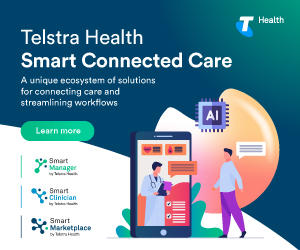Top digital trends in practice management
The digital age is quickly revolutionising medical practice management, and there are numerous innovations and growing trends already having a significant impact on streamlining practice workflow and boosting efficiency.
Cloud-based practice management
Innovative cloud-based practice management solutions are set to takeover server-based practice management, as they support increased collaboration in healthcare, allowing multiple stakeholders to share information securely and seamlessly across the network.
MedicalDirector’s recent whitepaper, Interoperability in healthcare: Synergising an industry, found a significant benefit of moving towards cloud-based solutions is that it supports more interoperable systems, which in turn benefits coordinated care and improved patient outcomes.
The report further revealed cloud-based health solutions provide the digital infrastructure needed to effectively coordinate more flexible patient-centric care. When it comes to the cloud, 64% of respondents admitted they consider flexibility to be the main benefit of using a cloud-based HER/PMS systems, enhancing the workflow capabilities of care teams and improving the patient experience.
Cloud-based applications like Helix, built on the robust market leading Microsoft Azure platform, are also becoming far more secure and sophisticated than on-premises legacy solutions. This is because cloud service providers must ensure data is encrypted, backed up, easily recoverable, and secured with strict role-based access.
It is also prudent to note that while cloud solution providers implement their security measures, healthcare organisations must ensure they have the right security architecture in place to keep sensitive data safe.
SMS alerts and booking efficiency
Text alerts are an effective way of reducing practice time and money wasted as a result of clients forgetting an appointment. In December 2017, the Behavioral Economics Team of the Australian Government ran a study looking at the effective use of SMS. They discovered it took an average of 10.5 minutes to restore a cancelled payment. It also found a timely SMS reminder to pay on time, saved 240 hours of staff time per fortnight. Those 240 hours could then be re-allocated to assist others in need, lower the burden on phone services, and improve overall service delivery for Australians.
This research has proved that reminders help people recall and attend to an immediate deadline for an otherwise forgotten or postponed task. If you implement an automated SMS system, you will have regular touchpoints with those renowned for being late, or not showing up, and in turn provide availability to those in need, so they can make the most of an unexpected empty slot.
Automating workflow management
Fax, paper and outdated workflow systems are a major frustration for GPs and Practice Managers, and with fax still as one of the main methods of communication between all healthcare professionals, the status quo simply won’t keep up with the rapid pace of technology.
“The more automated services we put into place, like streamlining bookings, automated reminders, systems that automatically text patients, solutions like HotDoc– all of these can help a lot,” Dr Charlotte Middleton, GP and Chief Medical Advisor at MedicalDirector, says. “We need to digitise our records more and think about increasing our interoperability between healthcare professionals and institutions.”
Vigilant data security measures
Sensitive patient data is becoming an increasing hot topic, and with new laws now in place tackling cyber security breaches, the pressure is on Practice Managers to embrace more robust, protected data management and storage solutions.
For Practice Managers serious about future-proofing their practice management system, strengthening data protection benefits everyone and helps to reduce the risk of regulatory burdens, financial losses, damaged reputation, and loss of patient trust.
All healthcare organisations need a proactive approach when it comes to managing personal information and develop a culture ingrained in data privacy, ensuring that any patient information collected is treated as an asset to be protected and managed with the utmost care.









